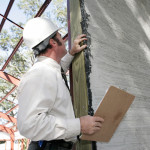Home inspection represents a key piece of the home-buying process –– an expert eye that gives an invaluable assessment of the biggest investment a buyer will make (and that a seller has previously made).
A good home inspector can ease the process and make sure there’s no surprises.
A bad home inspector can jeopardize a sale, hurting both sides of the real estate equation.
Here are a few ways to protect yourself against an unqualified home inspector.
A Note for Sellers
A lot of information about inspections aims at buyers, but they can help sellers.
You may even want to invest in an inspection before you put the home on the market, so you can fix potential issues, adjust the price point, or know what to expect at the negotiating table.
Remember to prep as much as you can to make the inspector’s job easier.
What to Look For
When hiring a home inspector, make sure the person doing the inspection is recommended by a reliable source.
You can consult the Better Business Bureau or the American Society of Home Inspectors (ASHI) to find a professional home inspector in your area. Ask friends and relatives who recently bought for recommendations. Your real estate agent might have someone they trust as well.
Find out what kind of qualifications, education, experience and credentials a potential home inspector has and whether they have a license. Do they engage in continuing education? Ask for references from former clients.
A home inspector should also have insurance, so ask what is covered in their insurance. It could be only the cost of the home inspection—or it might be more.
Request a Sample
A good inspector should provide one if you ask. He or she may offer an inspection checklist, but that doesn’t include enough detail to show what clients can expect in a report.
If the sample report is only a few pages long, this is an indication the prospective home inspector isn’t thorough enough. Some agencies may include a sample report on their website, so you don’t even have to ask.
Also, ask if you may accompany the inspector as he checks out the house. Agencies like HUD and the ASHI encourage this, so a buyer can see the home through expert eyes.
If an inspector balks at this request, it’s a red flag.
Customer Service
Does an inspector pick up the phone when you call, or return calls in a timely manner? Does the company take the time to answer your questions? Your purchase is a huge investment, and you deserve someone who will help you make a wise one.
If issues arise the seller needs to fix, what’s the inspector’s police on re-checking the property? Can you ask questions about the home inspection after they’ve sent you the report?
Good customer service will be a positive recommendation and will enable you to find someone you can trust.
What to Expect
Know what you’re getting for your money.
The average home inspection costs $300 to $500. You get what you pay for, so don’t try to economize on a home inspection.
A so-called bargain might end up costing you more in the long run if they miss “surprises” like foundation issues or electrical problems.
You should receive a report in about 24 hours, with photos, anywhere from 20 to 65 pages.
Based on an earlier version by Wendy Dickstein.


